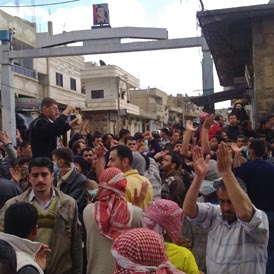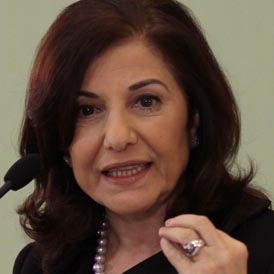Syria: The battle between reform and repression
As hundreds march through Damascus in protest at the deaths of pro-democracy demonstrators, a British-Arab journalist, formerly based in Syria, writes on the struggle between reform and repression.

The word “massacre” was being used by eyewitnesses. Figures vary wildly, with reports of dozens – possibly as many as 100 – people killed by Government forces in the southern Syrian city of Deraa.
Around 20,000 people took to the streets to bury the dead yesterday.
It all started with riots in which five people were killed last Friday. Over the weekend, the Government apologised and sent a presidential delegation to the city to listen to protestors.
Two of their key demands were met shortly afterwards. Fifteen schoolchildren, jailed for scrawling revolutionary graffiti, were released. And the city’s Governor, Faisal Kalthoum, was sacked.
Protestors holed themselves up in the Omari Mosque, and vowed to stay there until the rest of their demands were met. Forty-eight hours later, security forces broke into the building in the middle of the night, killing at least five more people.
The violence escalated after sunrise. The Government says 10 people were killed. Activists claim that up to 100 died.
The violence escalated after sunrise. The government says 10 people were killed. Activists claim that up to 100 died.
So why the sudden, violent turn of events, just hours after the Government began making concessions?
Syria‘s Government is notoriously opaque, but insiders claim there was a split, right at the heart of the regime.
It’s been the same story throughout the 11 years Bashar Al-Assad has been in power. The young, British-educated President’s reformist ambitions have been held back by an old guard of security-minded officials close to his father, the former President, who died in 2000.
Deraa may be the latest battlefield for these competing interests.

Thursday’s funeral processions passed off relatively peacefully. And once the streets were empty, the President’s spokeswoman, Bouthaina Shaaban – herself on the reformist wing of government – went on State TV to talk to a sceptical country.
She promised a package of reforms, including looking into repealing the emergency law, which has been in place for 48 years and gives near-unlimited powers to the military. Few believed the words would translate into actions.
In a country where the President admitted to the Wall Street Journal in January that reform could take a generation, Syria did the unthinkable in the space of a couple of hours. All of the political prisoners detained during the current unrest were reportedly set free.
‘Legitimate’ demands
Shaaban acknowledged that the protesters’ demands were legitimate. She announced that jobs would be created immediately, State salaries would be increased, opposition parties would be legalised and restrictions on the press would be lifted.
Minutes later, the security forces pulled back from central Deraa. An apparent victory for the reformists over the hawks.
Syrians are reacting with cautious optimism as the country appears to step back from the brink. There are still likely to be protests in Deraa as this bloody week draws to a close.
But the real test will be whether those demonstrations spread throughout Syria. If they do, then the military will be arguing that their hardline approach was right all along.
The author of this article is a British-Arab journalist who wishes to remain anonymous because of security concerns.